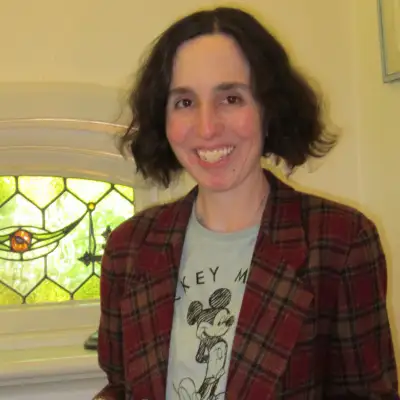Episode 61: [Value Boost] The 90-10 Rule for Transforming Data Science Impact
Download MP3[00:00:00] Dr Genevieve Hayes: Hello, and welcome to your Value Boost from Value Driven Data Science, the podcast that helps data scientists transform their technical expertise into tangible business value, career autonomy, and financial reward. I'm Dr. Genevieve Hayes, and I'm here again with Gregory Lewandowski. Chief AI strategist and founder of GLEW to turbocharge your data science career in less time than it takes to run a simple query.
[00:00:30] In today's episode, we're going to be discussing a simple principle that you can follow to transform your impact in data science. Welcome back Gregory.
[00:00:40] Gregory Lewandowski: Thank you, Genevieve. It's excellent.
[00:00:42] Dr Genevieve Hayes: So if listeners were to visit your LinkedIn page, one of the things they'd come across is your guiding principle that AI is 10 percent technology and 90 percent people.
[00:00:55] When I first saw that on your LinkedIn page, the way I interpreted it was that AI technology on its own isn't enough to create value within an organization. Most of the value is created by the people who are using the technology. Is that how you intended people to interpret that principle when you put it up?
[00:01:17] Gregory Lewandowski: I not exactly. So one of the things that I've learned throughout my career is that the best technologies in the world alone don't make the world turn. And we can go back to the industrial revolution, to the internet, to television, radio, cell phone, whatever it happens to be. These amazing technologies can do incredible things, but on their own, they still will be lackluster.
[00:01:53] And my belief here and I learned this through my work with analytics, actually, is that the technology must be accompanied by a cultural change in order to really be effective. And my belief, again, is AI is 10 percent technology, 90 percent people. I think we've seen very much like every other.
[00:02:17] Technology and over rotation in hiring and an over rotation in skills that are very, very technical. We're forgetting how do we make money, save money, make my clients happier, make my employees happier and de risk. We're forgetting about the. Executive care about with AI and we're forgetting, how do we accomplish and achieve these things?
[00:02:40] And it's not through building walls between organizations. It's through building bridges between the two organizations or three or five organizations. It's through selecting the right use cases, not the use cases that are. Selected with bias by the highest paid employee in the room, it is about ensuring that there is the right level of education and enablement.
[00:03:07] It is about ensuring that we have centers of excellence that can really drive the use of AI into a company's culture and to make it as invisible as possible. That's when we've really achieved true cultural balance here.
[00:03:25] Dr Genevieve Hayes: How do you see this principle of 10 percent technology and 90 percent people changing how data scientists approach their roles?
[00:03:35] Gregory Lewandowski: The way that I would see it approaching the roles is, number one, ensuring that there is a mental and organizational balance between the hard skills of delivering AI, as well as the practitioners of AI and the business itself.
[00:03:54] We don't want to fall in the trap of believing that one organization is more important than the other. and I see that trap a lot, whether it's the visualization team thinks that their work is more important than the data quality team. None of these things are true. It's without any one of them.
[00:04:10] This three legged stool of success is going to topple over. So number one is going to be in again, the mental and organizational balance to ensure that not everybody's voice is heard specifically, but that we keep in mind that everybody is delivering an important aspect to it.
[00:04:28] You may not want to believe that change management is just as important as the algorithm you're creating, but it is. And we've got to recognize that
[00:04:38] Dr Genevieve Hayes: Yeah, so don't have that data scientist as God type mentality that You sometimes see in some organizations.
[00:04:45] Gregory Lewandowski: Yeah, and I think that's a great way to state it. And these are individuals who have spent their lives learning more in hours than I will ever learn in my life probably and absolutely brilliant. But brilliance. Does not excuse behaviors that minimize others work to reach
[00:05:06] Dr Genevieve Hayes: So what's one concrete step our listeners can take this week to start shifting more towards a people centric view of data science?
[00:05:15] Gregory Lewandowski: out to a project manager, to a sales rep sit down and chat with them. Ask about their job, ask about what they do. Don't use any technical terms. Actually, have an interest in what they do and look for one or two areas where you might be able to help them. I mean, it's at the end of the day, which again is a cliche.
[00:05:36] I try to stop using. Sorry about that. It's about people. We're in an age where people are talking about a I getting rid of the creativity and starting to remove the human element of things. But it is still all about people and relationships.
[00:05:51] That's what our jobs are. They are relationships.
[00:05:54] Dr Genevieve Hayes: Best thing I ever did in several organizations I worked in was Every day I'd bring my sandwich to work and I'd toast it in the lunchroom at lunchtime. And so I'd spend about five to ten minutes just standing in the lunchroom waiting for my cheese to melt on my bread and in that five to ten minutes, I'd talk to whoever else was in the lunchroom.
[00:06:15] I made so many connections from that without even trying. So yeah, just hang around the lunchroom.
[00:06:22] Gregory Lewandowski: Talking about the weather can be your best opening line.
[00:06:27] Dr Genevieve Hayes: Weather today and data science opportunities tomorrow.
[00:06:31] Gregory Lewandowski: That's right. But again, just reach out. People are happy to help. People are happy to sit down. And people love to talk about themselves too. You've got to remember that. So ask them about themselves. Ask them, about their work. And you know what? Even ask about them personally.
[00:06:47] Dr Genevieve Hayes: That's how we build relationships.
[00:06:49] And that's a wrap for today's value boost. But if you want more insights from Gregory, you're in luck. We've got a longer episode with Gregory where we explore the five executive care abouts. Five executive priorities that you can leverage to gain faster buy in and support for your data science work.
[00:07:08] Dr Genevieve Hayes: And it's packed with no nonsense advice for turning your data skills into serious clout, cash, and career freedom. You can find it now, wherever you found this episode or at your favorite podcast platform. Thanks for joining me again, Gregory. And
[00:07:25] Gregory Lewandowski: much for having me. It was a pleasure. And I wish you continued success.
[00:07:31] Dr Genevieve Hayes: for those in the audience, thanks for listening. I'm Dr. Genevieve Hayes, and this has been Value Driven Data Science.
Creators and Guests
![Episode 61: [Value Boost] The 90-10 Rule for Transforming Data Science Impact](https://img.transistorcdn.com/1S_-FHWTSYLwlZw4Bul2D1FFcsDYJwGa0xZKfIO2hbw/rs:fill:0:0:1/w:800/h:800/q:60/mb:500000/aHR0cHM6Ly9pbWct/dXBsb2FkLXByb2R1/Y3Rpb24udHJhbnNp/c3Rvci5mbS80YzU3/MWI0ZjdlNDA1OTYz/ZGE1OWEyYTEyODk4/NDQ2NC5qcGc.webp)

